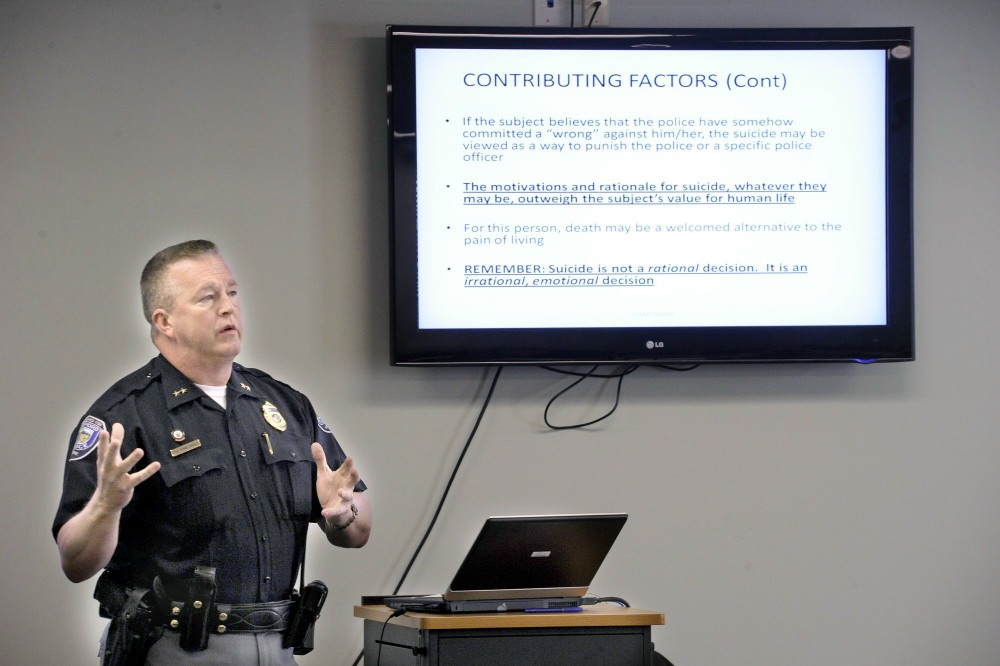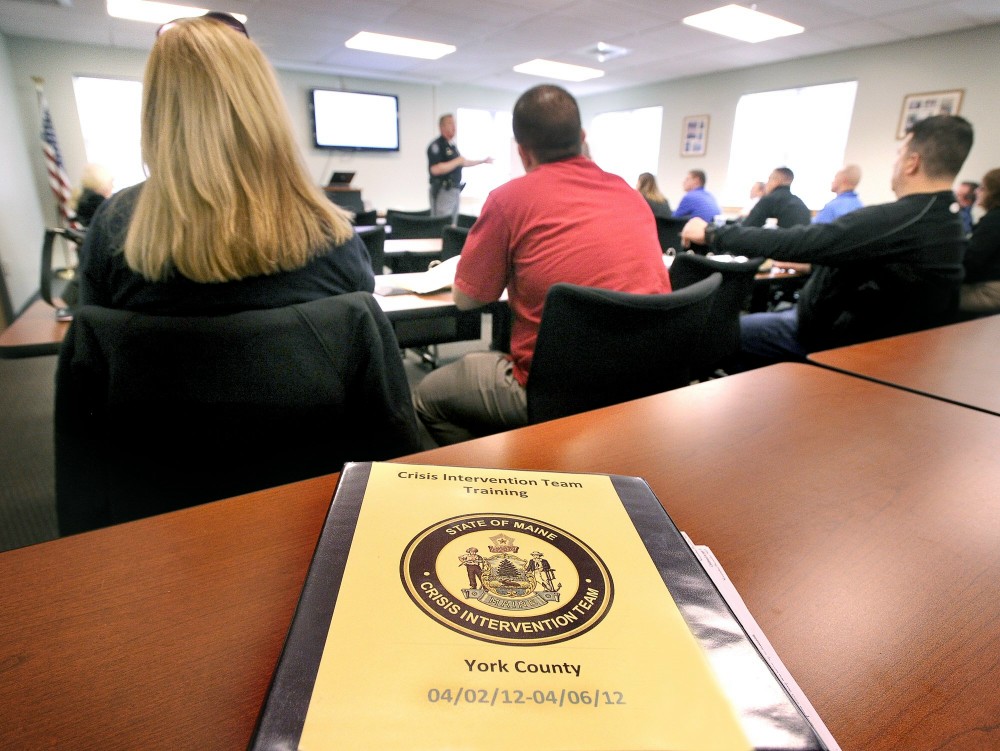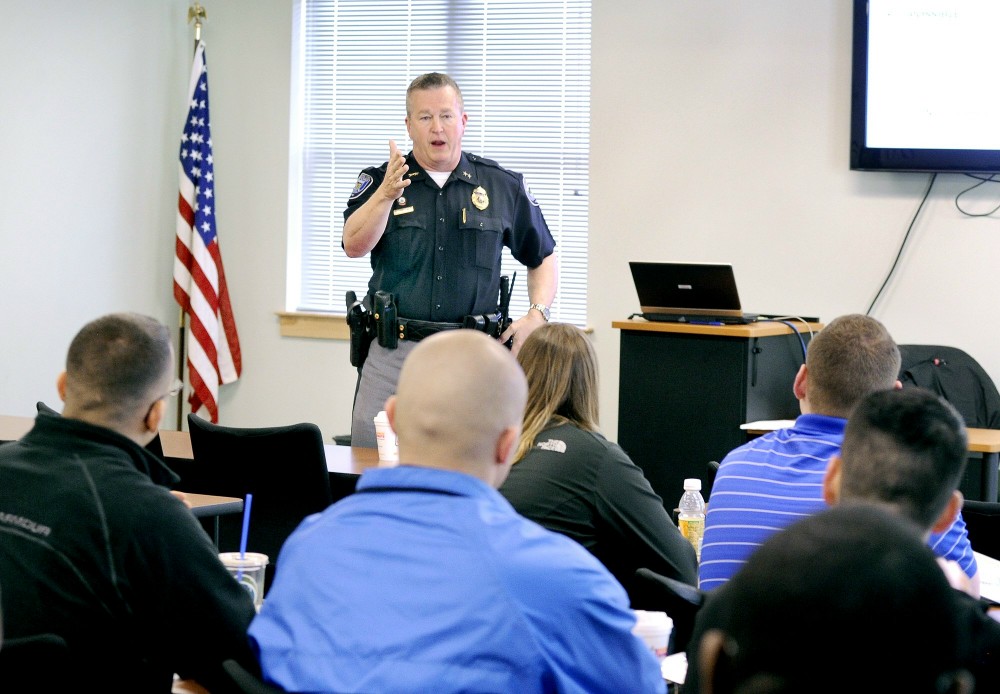SANFORD – Police are trained to move in fast and gain control. But when they respond to find a person who is mentally unstable or impaired, that’s not always the best strategy, according to Sanford Police Chief Thomas Connolly Jr.
“On these calls, you have to slow down,” he said. “You can’t think five minutes. It may be five hours.”
Connolly advised officers to make a quick plan for working together at the scene. Consider less lethal alternatives. Above all, don’t be afraid to retreat and de-escalate a crisis.
Connolly shared his views during a presentation last April to local police officers, on the final day of a weeklong Crisis Intervention Team training class.
The training class, known as CIT, is a voluntary, community-based program that helps police and corrections officers handle calls and situations involving people undergoing a psychiatric crisis. At its core are techniques meant to calm disturbed people and lower the potential for someone being shot.
Despite the lack of hard statistics, the specialized, 40-hour training is considered the best tool in law enforcement to reduce incidents of force and restraint, as well as officer injuries.
Most Maine police, however, haven’t received this training, due largely to money issues.
Connolly believes the investment is critical. He estimates that roughly half of the people that Sanford officers confront these days are suffering from mental health problems, if not an outright psychotic crisis. That’s why he sent 25 of his 40 officers through a CIT course, using a federal grant in April to offset overtime shifts for five officers.
The Sanford session also included five officers from Biddeford, the first time that department has participated.
Sessions are organized and run by the Maine chapter of the National Alliance on Mental Illness. Training this year also was held in other locations, including Madison, Augusta and Cape Elizabeth and the Maine State Prison in Warren.
Connolly brought a lot of credibility to his presentation. A former major in Maryland’s Prince Georges County police department, he has shot two people in his 30-year career, killing one of them. He also has a master’s degree in psychology.
“This class is one of the best you can take,” he said of CIT training. “This is stuff you’ll probably use tonight.”
Connolly spent time on how to handle a situation generally feared by responding officers, what criminologists call “police-assisted suicide.” On the street, it has a less academic name, “suicide-by-cop.” People who use life-threatening behavior to provoke police are a leading reason why officers wind up using their guns, criminologists say.
“But there are things we can do as police officers to not let them get the outcome they desire,” Connolly said.
He pointed to research showing that the vast majority of suicide-by-cop calls involved armed men, many with a prior history of suicide attempts and an involvement in alcohol or drugs. Seven in 10 shootings took place within 30 minutes of police contact.
The speed at which shots are fired argues for better, more thoughtful tactics, Connolly said. That may include backing off to defuse tension, if others aren’t in danger.
But pulling back is counter to conventional practice in police and military training, where there’s a reluctance to give up ground.
“Using deadly force may ultimately be necessary,” he said, “but it should be viewed as the least desirable outcome and avoided, if possible, at all costs.”
The week of training was valuable for John Flewelling, Sanford’s community policing officer.
Flewelling said he works in the town’s high-crime areas and comes in contact daily with people who have mental health problems. He appreciated learning more about diseases and treatment, and how specific illnesses can affect a person’s behavior. Taking the course will help relieve some of the stress of the job, he said.
“Now you have options,” he said. “It’s a tool for your toolbox that you may not have had.”
Derek McDonald, an officer from Biddeford, said the week of CIT training will broaden his knowledge of how to evaluate a situation and consider options, how to slow down and “take it all in.” He became more aware of how the arrival of police can scare someone in the midst of a psychotic episode, even if his goal is to help.
“One tactic is to present yourself in a less-threatening manner, because it may be a crisis they’re going through,” he said.
Send questions/comments to the editors.







Success. Please wait for the page to reload. If the page does not reload within 5 seconds, please refresh the page.
Enter your email and password to access comments.
Hi, to comment on stories you must . This profile is in addition to your subscription and website login.
Already have a commenting profile? .
Invalid username/password.
Please check your email to confirm and complete your registration.
Only subscribers are eligible to post comments. Please subscribe or login first for digital access. Here’s why.
Use the form below to reset your password. When you've submitted your account email, we will send an email with a reset code.